
Introduction
In recent years, artificial intelligence (AI) has transformed many aspects of our daily lives, from automating tasks to enhancing decision-making in various industries. Among these advancements, the field of music composition has emerged as a unique area of growth. AI-powered tools are now reshaping how music is created, composed, and even personalized for listeners. This article explores the impact of AI on music composition, the technologies driving this revolution, and the pros and cons of integrating AI into the music industry.
The Rise of AI in Music Composition
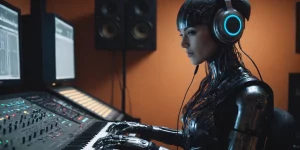
1. AI’s Role in the Creative Process
AI in music composition leverages machine learning algorithms to analyze vast amounts of music data, learning patterns, and styles from countless compositions. By understanding these patterns, AI can generate new pieces that mirror the complexities and nuances of human-composed music. This includes creating original melodies, harmonizing notes, and even simulating the styles of famous composers. Tools like OpenAI’s MuseNet and Google’s Magenta have taken strides in AI music composition, offering musicians and producers new resources to inspire and innovate.
2. Real-World Examples of AI in Music
Many prominent artists and companies are now using AI-driven tools for composition. For example, the Japanese composer Nobuo Uematsu has used AI to generate background scores for video games, while companies like Aiva Technologies have developed AI software that can compose symphonies. These tools offer creators a fresh way to approach composition, whether it’s generating ideas or crafting entirely new works.
How AI Enhances Music Production
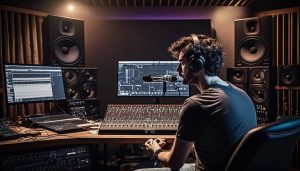
1. AI as a Tool for Musicians and Producers
AI doesn’t replace human creativity; rather, it complements it. For musicians, AI can be an assistant that suggests harmonies, generates background music, or even remixes existing songs. For producers, AI can help streamline the production process by analyzing audio for quality, suggesting edits, and automating repetitive tasks. These AI capabilities make music production faster, more efficient, and accessible for independent artists who may not have extensive resources.
2. Benefits of Using AI in Music Production
AI can cut down production time significantly by automating mundane tasks, allowing creators to focus on the artistic aspects of their work. Moreover, AI can assist in music mastering, ensuring a balanced sound across tracks, and optimizing music for various platforms. This not only helps artists but also makes high-quality music production available to a wider audience.
How AI is Changing the Music Industry
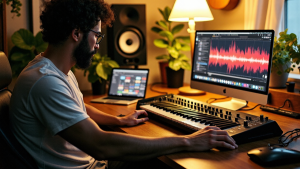
1. AI Tools for Everyone
One of the best things about AI in music is that it is accessible to many people. Musicians of all skill levels can use AI tools to help them create music. Whether you’re a beginner or a professional, these tools can guide you in writing songs. They can suggest different melodies and rhythms, making it easier to find new ideas. This accessibility means that more people can express themselves through music, leading to a greater diversity of sounds and styles.
2. AI and Music Education
AI is also playing a role in music education. New apps and software can teach music theory and composition. They provide instant feedback to students, helping them improve their skills. For example, students can compose music and get suggestions on how to make it better. This kind of immediate help makes learning more effective and enjoyable. As a result, AI is helping to inspire the next generation of musicians.
3. Creating Music Collaboratively
AI is changing how artists collaborate with each other. In the past, musicians often needed to be in the same place to work together. Now, with AI, artists can share their work digitally and get AI-generated suggestions in real time. This means that artists from different parts of the world can create music together more easily. It opens the door to exciting new collaborations that may not have been possible before.
4. AI in Live Performances
AI is also making waves in live music performances. Some artists use AI to enhance their shows with visual effects that respond to the music. This can create an immersive experience for the audience. For example, light shows can change according to the rhythm of the music, making the performance more engaging. AI can also help musicians improvise live by suggesting new musical ideas during their set.
5. Exploring New Genres
With AI, musicians can explore new genres and styles that they might not usually consider. For instance, an artist who typically plays rock music might use AI to create electronic music. This cross-genre experimentation can lead to fresh and unique sounds. AI helps artists step outside their comfort zones, pushing the boundaries of what music can be.
Key Technologies Behind AI Music Composition
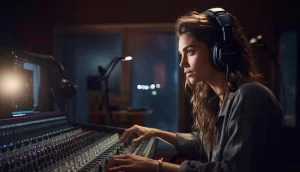
1. Machine Learning and Neural Networks
Machine learning and neural networks are the backbones of AI music composition. By analyzing thousands of compositions, AI systems learn the structure, harmony, and rhythm that define different genres. These algorithms then apply this knowledge to create new, original compositions that adhere to established musical principles while still introducing unique elements.
2. Generative Adversarial Networks (GANs)
Generative adversarial networks (GANs) are a type of AI that plays a crucial role in music generation. In GANs, two networks (the generator and discriminator) work against each other, helping the AI create more realistic and refined music. The generator creates new pieces while the discriminator evaluates them, leading to continuous improvement in the AI’s output over time.
Challenges and Limitations of AI in Music Composition
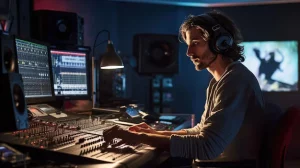
1. Potential Loss of Human Touch
One criticism of AI-generated music is the potential lack of emotional depth and human touch. Music often reflects human experience, emotions, and creativity—qualities that some fear may be diminished in AI-composed pieces. While AI can replicate styles and techniques, critics argue that it may lack the soulfulness and originality that come from personal experience.
2. Ethical and Copyright Concerns
As AI compositions become more common, questions around ownership and copyright have emerged. If AI creates a piece, who owns it—the programmer, the user, or the AI itself? These issues are complex and could impact how the industry treats AI-generated music in terms of licensing, distribution, and monetization.
The Future of AI Music Composition
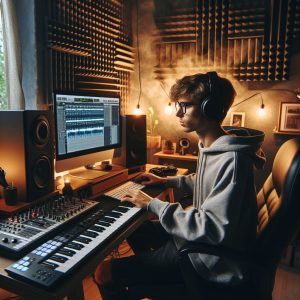
1. Personalized Music Experiences
AI may revolutionize the way listeners experience music by tailoring compositions to individual preferences. Imagine a world where your streaming service generates custom music based on your mood, location, and even the time of day. This level of personalization could change how people engage with music and potentially lead to unique listening experiences for each person.
2. Collaboration Between AI and Human Composers
As AI technology advances, a promising future could see more collaborations between AI and human composers. Artists may use AI to generate melodies or harmonies, which they can then customize and refine. This partnership could lead to innovative new music genres and styles, bridging the gap between technology and human creativity.
Analysis Table
| Aspect | Description | Impact on Music Industry |
|---|---|---|
| Efficiency | Faster composition and production times | Streamlined workflows, lower costs |
| Creativity Assistance | AI suggests harmonies, melodies, and styles | Empowers musicians, offers new inspiration |
| Personalized Listening | Music tailored to listener preferences | Enhanced user experience, deeper engagement |
| Production Quality | AI mastering and balancing | Consistently high-quality audio output |
| Ethical Concerns | Ownership and copyright questions | Requires industry regulation and legal frameworks |
| Emotional Depth | Potential lack of human touch | Mixed reception among artists and audiences |
Comparative Table: AI vs. Human Composition
| Factor | AI Composition | Human Composition |
|---|---|---|
| Speed | Fast, can generate compositions instantly | Variable, depends on artist and complexity |
| Creativity | Learns from data, may lack true originality | Unique, based on personal experience |
| Adaptability | Can mimic styles and genres | Highly adaptable to new genres and styles |
| Emotional Connection | Limited, based on algorithmic predictions | High often reflects personal emotions |
| Cost | Low, especially for repetitive tasks | Variable, potentially higher |
| Quality Consistency | High, algorithmically mastered | Variable, based on artist and resources |
Conclusion
AI is undeniably shaping the future of music composition, offering tools that enhance creativity, streamline production, and personalize the listening experience. While some concerns remain about the loss of human touch and ethical implications, the benefits of AI in music composition are significant. As technology advances, AI may become a collaborator for musicians, sparking new genres and styles. By embracing AI, the music industry can look forward to a future filled with innovative compositions and unique musical experiences.








